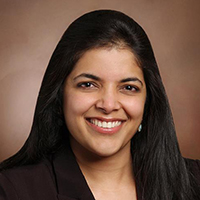Of the 18,000 people diagnosed with large B-cell lymphoma each year, only half will be successfully treated with chemotherapy. The 9,000 remaining patients typically have poor outcomes, with only 25% responding to additional, higher-intensity chemotherapy, followed by a stem cell transplant.
“For around three-quarters of patients who don’t respond to the initial chemotherapy, their survival has been a matter of months,” says CU Cancer Center member Manali Kamdar, MD, associate professor in the Division of Hematology at the University of Colorado School of Medicine. “Improving outcomes with more efficacious and safe therapies has been a critical unmet need for these high risk patients for the longest time.”
Improving outcomes with new medication
Over the past four years, Kamdar has been the lead investigator on a global, multicenter, phase III clinical study to find out if a medication called Breyanzi (lisocabtagene maraleucel; liso-cel) can improve outcomes for those patients. The chimeric antigen receptor (CAR) T-cell therapy works by removing blood from a patient’s body, enhancing immune cells called T cells to better fight the lymphoma, then re-infusing the cells back into the patient. In a December 11 presentation at the American Society of Hematology’s annual meeting, Kamdar shared the results of the study: Breyanzi is effective at treating large B-cell lymphoma patients who did not respond to the initial round of chemotherapy.
“I am delighted to say, on behalf of all the coauthors, that this is a positive trial because it met its primary endpoint of event-free survival,” Kamdar says. “We were able to get more patients in a complete response with liso-cel than with an autologous stem cell transplant. And we were able to keep patients without relapse for a longer period of time than patients who receive standard of care.”
Just as important, Kamdar says, the medication was safer for patients than other CAR-T drugs, with mostly low-grade side effects such as cytokine release syndrome and neurological side effects. Breyanzi was eventually able to be administered on an outpatient basis, she says, making it a less time-consuming and costly treatment for patients.
“We want to make sure that things are efficacious, but if it comes at the cost of higher toxicity, then you lose the point of it all,” Kamdar says. “It’s important to highlight that this was an extremely safe product, that the toxicities between liso-cel and standard of care were comparable.”
Clinical trials benefit CU Cancer Center patients
The phase III trial enrolled 184 patients across 47 global sites, the majority of them at the CU Cancer Center and UCHealth University of Colorado Hospital. Kamdar says it’s another example of how CU Cancer Center patients often receive promising new treatments earlier than others.
“We were leaders in making sure that our patients, not just from Colorado, but also from neighboring states of Wyoming, New Mexico, Kansas ended up getting the benefit of this product sooner,” Kamdar says. “It's definitely changed what my clinic used to look like. Prior to this clinical trial being available, most of my patients with relapsed or refractory DLBCL would not benefit from traditional treatments and eventually succumbed to their disease. However, this clinical trial provided a ray of hope for these high-risk relapsed patients. Just last week, I saw a patient who had this treatment, and I don't recall talking about lymphoma with her. She has been in remission for several months.”
Next stop, regulatory review
Researchers will continue to follow patients in the phase III trial over the next two years to track relapse rates and overall survival, but based on the study led by Kamdar, the drug’s manufacturer, Bristol Myers Squibb, is eager to discuss the results with health/regulatory authorities. Kamdar says an approval would mark a paradigm shift in the way these types of cancers are treated, marking the first improvement in treatment in more than 20 years
“I wouldn’t be surprised if with a longer follow-up of the study, we actually end up making patients live longer,” Kamdar says. “It's not confirmed yet, because it's been a short follow-up so far. But if we look at the survival curves, the survival curves have clearly split in favor of liso-cell. As investigators, we are very excited to see what the longer follow-up looks like.”




